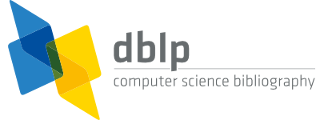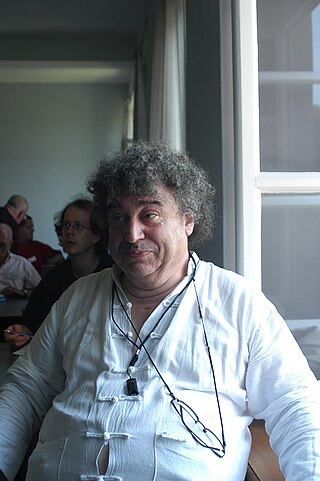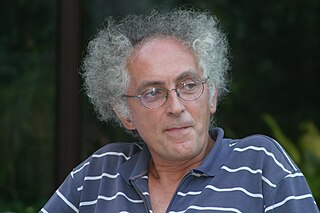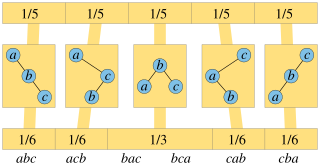Related Research Articles

Donald Ervin Knuth is an American computer scientist and mathematician. He is a professor emeritus at Stanford University. He is the 1974 recipient of the ACM Turing Award, informally considered the Nobel Prize of computer science. Knuth has been called the "father of the analysis of algorithms".

Robert Sedgewick is an American computer scientist. He is the founding chair and the William O. Baker Professor in Computer Science at Princeton University and was a member of the board of directors of Adobe Systems (1990–2016). He previously served on the faculty at Brown University and has held visiting research positions at Xerox PARC, Institute for Defense Analyses, and INRIA. His research expertise is in algorithm science, data structures, and analytic combinatorics. He is also active in developing the college curriculum in computer science and in harnessing technology to make that curriculum available to anyone seeking the opportunity to learn from it.
Combinatorics is a branch of mathematics concerning the study of finite or countable discrete structures.

DBLP is a computer science bibliography website. Starting in 1993 at Universität Trier in Germany, it grew from a small collection of HTML files and became an organization hosting a database and logic programming bibliography site. Since November 2018, DBLP is a branch of Schloss Dagstuhl – Leibniz-Zentrum für Informatik (LZI). DBLP listed more than 5.4 million journal articles, conference papers, and other publications on computer science in December 2020, up from about 14,000 in 1995 and 3.66 million in July 2016. All important journals on computer science are tracked. Proceedings papers of many conferences are also tracked. It is mirrored at three sites across the Internet.

Philippe Flajolet was a French computer scientist.
In mathematics, a combinatorial class is a countable set of mathematical objects, together with a size function mapping each object to a non-negative integer, such that there are finitely many objects of each size.

Dagstuhl is a computer science research center in Germany, located in and named after a district of the town of Wadern, Merzig-Wadern, Saarland.
In graph theory, a recursive tree is a labeled, rooted tree. A size-n recursive tree's vertices are labeled by distinct positive integers 1, 2, …, n, where the labels are strictly increasing starting at the root labeled 1. Recursive trees are non-planar, which means that the children of a particular vertex are not ordered; for example, the following two size-3 recursive trees are equivalent: 3/1\2 = 2/1\3.
Backhouse's constant is a mathematical constant named after Nigel Backhouse. Its value is approximately 1.456 074 948.
The Symposium on Theoretical Aspects of Computer Science (STACS) is an academic conference in the field of computer science. It is held each year, alternately in Germany and France, since 1984. Typical themes of the conference include algorithms, computational and structural complexity, automata, formal languages and logic.

Luc P. Devroye is a Belgian computer scientist and mathematician and a James McGill Professor in the School of Computer Science of McGill University in Montreal, Quebec, Canada.
Adriano Mario Garsia is a Tunisian-born Italian American mathematician who works in analysis, combinatorics, representation theory, and algebraic geometry. He is a student of Charles Loewner and has published work on representation theory, symmetric functions, and algebraic combinatorics. He and Mark Haiman made the N!_conjecture. He is also the namesake of the Garsia–Wachs algorithm for optimal binary search trees, which he published with his student Michelle L. Wachs in 1977.
The European Symposium on Algorithms (ESA) is an international conference covering the field of algorithms. It has been held annually since 1993, typically in early Autumn in a different European location each year. Like most theoretical computer science conferences its contributions are strongly peer-reviewed; the articles appear in proceedings published in Springer Lecture Notes in Computer Science. Acceptance rate of ESA is 24% in 2012 in both Design and Analysis and Engineering and Applications tracks.
WADS, the Algorithms and Data Structures Symposium, is an international academic conference in the field of computer science, focusing on algorithms and data structures. WADS is held every second year, usually in Canada and always in North America. It is held in alternation with its sister conference, the Scandinavian Symposium and Workshops on Algorithm Theory (SWAT), which is usually held in Scandinavia and always in Northern Europe. Historically, the proceedings of both conferences were published by Springer Verlag through their Lecture Notes in Computer Science series. Springer continues to publish WADS proceedings, but starting in 2016, SWAT proceedings are now published by Dagstuhl through their Leibniz International Proceedings in Informatics.
The Annual ACM Symposium on Theory of Computing (STOC) is an academic conference in the field of theoretical computer science. STOC has been organized annually since 1969, typically in May or June; the conference is sponsored by the Association for Computing Machinery special interest group SIGACT. Acceptance rate of STOC, averaged from 1970 to 2012, is 31%, with the rate of 29% in 2012.

In computer science and probability theory, a random binary tree is a binary tree selected at random from some probability distribution on binary trees. Different distributions have been used, leading to different properties for these trees.
Raimund G. Seidel is a German and Austrian theoretical computer scientist and an expert in computational geometry.
In combinatorial mathematics and theoretical computer science, a permutation pattern is a sub-permutation of a longer permutation. Any permutation may be written in one-line notation as a sequence of entries representing the result of applying the permutation to the sequence 123...; for instance the sequence 213 represents the permutation on three elements that swaps elements 1 and 2. If π and σ are two permutations represented in this way, then π is said to contain σ as a pattern if some subsequence of the entries of π has the same relative order as all of the entries of σ.

Carl Svante Janson is a Swedish mathematician. A member of the Royal Swedish Academy of Sciences since 1994, Janson has been the chaired professor of mathematics at Uppsala University since 1987.
The Philippe Flajolet Lecture Prize is awarded to for contributions to analytic combinatorics and analysis of algorithms, in the fields of theoretical computer science. This prize is named in memory of Philippe Flajolet.
References
- 1 2 "Analysis of Algorithms". aofa.cs.purdue.edu.
- ↑ "Flajolet Prize". aofa.cs.purdue.edu.
- ↑ "Problems That Phillipe Would Have Loved - AofA 2014 Lecture by Don Knuth" (PDF).
- ↑ "Discrete Mathematics & Theoretical Computer Science - DMTCS Proceedings vol. AI, Fifth Colloquium on Mathematics and Computer Science". dmtcs.episciences.org.
- ↑ "The First Workshop on Analytic Algorithmics and Combinatorics". archive.siam.org.
- ↑ Flajolet, Philippe (January 25, 2001). "D⋅e⋅k=(1000)8". Random Structures & Algorithms. 19 (3–4): 150–162. doi:10.1002/rsa.10022. S2CID 209833638 – via Wiley Online Library.
- ↑ "pf60". algo.inria.fr.
- ↑ "Philippe Flajolet and Analytic Combinatorics Conference in the memory of Philippe Flajolet Paris-Jussieu, 14-15-16 December 2011". algo.inria.fr.
- ↑ "Combinatorics, Probability and Computing: Volume 23 - Honouring the Memory of Philippe Flajolet - Part 1 | Cambridge Core". Cambridge Core.
- ↑ "Home". knuth80.elfbrink.se.